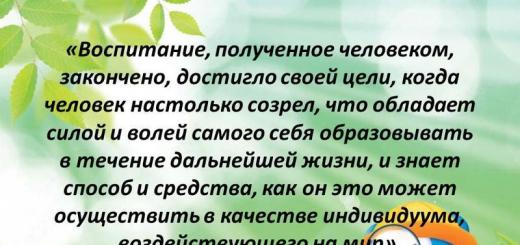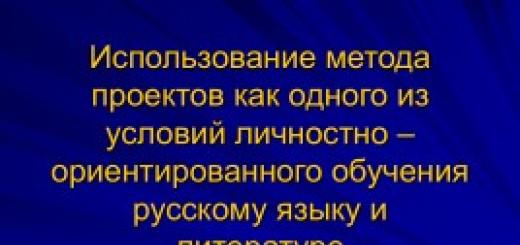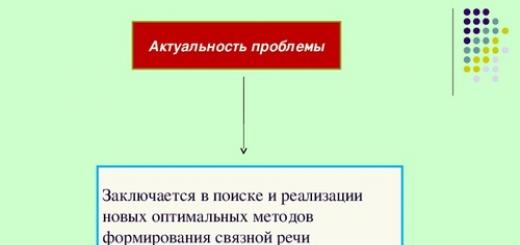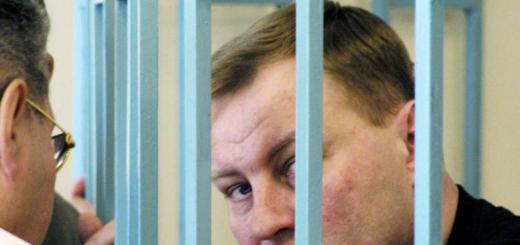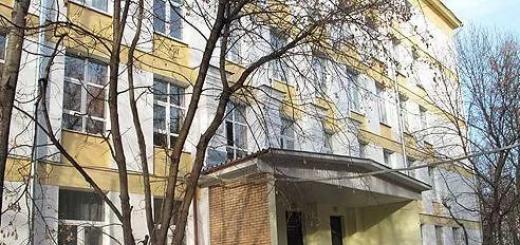
Slides and text of this presentation
Slide 1

The fate of the family of A.S. Pushkin
Completed by students of grade 9 A: Zenova Karina Bulankina Ksenia Sartakov Maxim Teacher: Bochkareva Galina Rudolfovna
Slide 2

Family life after the death of A.S. Pushkin
Natalia Nikolaevna took the death of her husband very hard. She could not stay in the capital, where everything reminded her of her husband. Natalia Nikolaevna returned with her children to St. Petersburg in 1839. She settled in a rented apartment on Aptekarsky Lane and for a long time led a very secluded life. Only relatives and close family friends visited her. She was visited by V.I. Dal, Vyazemsky, Karamzin, Pletnev. Living in St. Petersburg was not easy. Natalia Nikolaevna almost constantly experienced serious financial difficulties, but she invariably refused offers of profitable marriages, realizing that potential suitors were only interested in her beauty.
Slide 3

New marriage of Natalya Nikolaevna
Natalia Nikolaevna's brother Sergei Goncharov brought his fellow soldier General Pyotr Petrovich Lansky, commander of the Horse Guards regiment, into her house. Tom was already 45 years old, he considered himself an inveterate bachelor and clearly had no intention of getting married. But, visiting the cozy house of Natalia Nikolaevna, communicating with the children, to whom he sincerely became attached, the general realized that it was here that he could find his happiness. In 1844, seven years after the death of Alexander Sergeevich, Natalya Nikolaevna accepted Lansky’s offer. The wedding took place on July 16, 1844 in Strelna.
Slide 4

Life with her new husband turned out quite well for Natalia Nikolaevna. Sincere relationships reigned in the family. Pyotr Petrovich treated the memory of Pushkin and Natalia Nikolaevna’s feelings for him with great tact, and enjoyed working with the children, whom he accepted as family. Soon the family grew, daughters were born: Alexandra, Elizaveta and Sophia. Unfortunately, the difficult experiences that befell Natalia Nikolaevna affected her health. She began to get sick often. Doctors found that she had heart and lung diseases, which were aggravated by nervous exhaustion. Despite appeals to the best Russian doctors and trips abroad for treatment, it was not possible to cope with the diseases. In the fall of 1863, Natalya Nikolaevna went to Moscow for her grandson’s christening. On the way, she caught a cold and upon returning to St. Petersburg fell ill with severe pneumonia. The disease turned out to be fatal, and on November 26 Natalia Nikolaevna Lanskaya died.
Slide 5

Children of A.S. Pushkin Pushkin had four children
Slide 6

Maria Alexandrovna was born on May 19, 1832 in St. Petersburg, she was named Maria in honor of A.S. Pushkin’s grandmother, Maria Alekseevna Hannibal. She received home education. At the age of nine she spoke, wrote and read fluently in German and French. Later, Maria Alexandrovna studied at the privileged Catherine Institute
Slide 7

Maria Alexandrovna Pushkina (1832-1919)
After graduating from the institute in December 1852, she became a maid of honor to Empress Maria Alexandrovna, wife of Alexander II. In April 1860, at the age of 28, she married Leonid Nikolaevich Hartung, major general, manager of the Imperial stud farms in Tula and Moscow. The husband died in 1877. She had no children. She often visited her half-sisters Lansky. Maria Alexandrovna took an active part in everything that was connected with her father and the memory of him. In 1880, she was present with her brothers and sister at the opening of the monument to Pushkin in Moscow. For many years she then came to the Pushkin monument on Tverskaya and sat near it for hours. Maria Alexandrovna died in Moscow on March 7, 1919. She was buried in the cemetery of the Donskoy Monastery.
Slide 8

Pushkin Alexander Alexandrovich (1833-1914)
This is the beloved son of Pushkin and Natalya Nikolaevna. They called him "Sashka". Since childhood, he has raised great expectations with his wild temperament and energy. A student of the Corps of Pages, from which he was released as a cornet in the Life Guards Horse Regiment in 1851. He had an excellent military career, rose to the rank of lieutenant general, participated in the Balkan conflict, and was awarded orders and medals. After his resignation, he became a privy councilor and provincial councilor
Slide 9

Pushkin Grigory Alexandrovich (1835-1905)
Graduated from the Corps of Pages. He retired with the rank of lieutenant colonel; State Councillor. He lived in Mikhailovskoye from the 1860s. For a very long time he was in an inappropriate relationship with a beautiful French woman. She gave birth to Gregory three daughters. Natalya Nikolaevna was very worried about her son. Only in 1884 did he marry Varvara Alekseevna Moshkova, née Melnikova. Until 1899 he lived with his wife in Mikhailovskoye. Grigory Alexandrovich did not leave any legitimate children. In the 1880s, he donated his father’s library to the Rumyantsev Museum. In 1899 he moved to the estate of Marcoutier’s wife, where he died. True, the son did not inherit his father’s talents, but he carefully preserved the memory of his great father; his faithful assistant in this noble cause was his wife, Varvara Melnikova
Slide 10

She was educated at home. Contemporaries called her “the beautiful daughter of a beautiful mother.” At the age of 17, she accepted an offer from M. L. Dubelt. Mother Natalya Nikolaevna and stepfather P.P. Lanskoy were against this marriage: Dubelt was famous for his violent character, he was a player, but they could not do anything: Natalya Alexandrovna insisted on her own, fearing to repeat the fate of her older sister, who was not yet married at that time. What happened was what the Lanskys feared: the marriage broke up, the couple separated in 1862. Natalya Alexandrovna went abroad with her two older children to visit her aunt A.N. Friesengof, and her mother also stayed there. Dubelt followed his wife to the Friesengoff estate
Slide 11

Pushkina Natalya Alexandrovna (1836-1913)
In her marriage to Dubelt, Natalya Alexandrovna had three children:
Natalya Mikhailovna Dubelt-Bessel
Leonty Mikhailovich Dubelt,
Anna Mikhailovna Dubelt-Kondyreva,
Natalya Alexandrovna Dubelt received a divorce only in 1868, already unofficially the wife of Prince Nicholas Wilhelm of Nassau. During the divorce, Natalya Alexandrovna had to cede to her husband the right to raise one of her daughters, Anna. The two remaining children were also in Russia, under the wing of their loving grandmother, Natalya Nikolaevna Pushkina-Lanskaya. Natalya Alexandrovna has already finally settled abroad. She had known the German Prince Nicholas Wilhelm of Nassau for a long time, since 1856: they met in secular society during his visit to Russia.
Slide 12

Pushkina Natalya Alexandrovna (1836-1913)
In her marriage to Nassau, Natalya Alexandrovna also had three children: Sofya Nikolaevna Merenberg (Countess de Torby), Georg-Nikolai von Merenberg, Alexandra Nikolaevna von Merenberg. Natalya Alexandrovna lived a long and colorful life. She taught her children to speak Russian, and this ability and interest in Russian roots, lively and genuine, was preserved among her distant descendants. They cannot visit her grave, since the Countess-Princess's ashes are scattered in the family crypt, over her husband's coffin. She indicated this in her will, knowing that she would be denied the privilege of lying next to her husband, who had sacrificed so much for her.
Slide 13

Grandchildren of A.S. Pushkin Maria Alexandrovna Pushkina-Bykova (1862-1939).
Her husband Nikolai Vladimirovich Bykov, son of Gogol’s sister, Elizaveta Vasilyevna, captain-captain, an indispensable member of the Poltava provincial presence. Thus, with his granddaughter, Pushkin became related to Gogol. Having married, Nikolai Bykov settled in the village. Vasilievka in the family estate of the Gogol family, where they lived until the October Revolution, having built a spacious outbuilding on the opposite bank of the pond,
preserving the house and outbuilding in which N. Gogol grew up and worked. N.V. Bykov was shot in 1918, and Maria Alexandrovna died in 1939. They were buried in Poltava. The Bykovs' house was burned down during the Civil War, the Gogol's house and outbuilding were restored in 1984, after it was destroyed in 1943. They had 11 children, but these are side descendants of Pushkin, as they are on the female side.
Slide 14

Pushkin Nikolai Alexandrovich (1885-1964)
Grandson of the poet, son of A.A. Pushkin from his second marriage. In 1915, Nikolai Alexandrovich was mobilized into the active army. In 1916-1917, he served as an officer in the First Sumy Hussar Regiment, stationed in the Tambov province. In 1916 - 1917 served as an officer in a cavalry unit stationed in the city of Kirsanov. Living with him in Kirsanov were: Nadezhda Alekseevna Petunnikova, son Alexander and daughter Natalya.
From 1923 he lived in Brussels in exile, where he died in 1964. Now the grandson of Nikolai Alexandrovich, Alexander Alexandrovich (b. 1942), lives in Belgium. Alexander Alexandrovich Pushkin is the chairman of the Union of Russian Nobles in Belgium, deputy chairman of the International A. S. Pushkin Foundation. His wife Maria-Madeleine Alexandrovna Pushkina is the chairman of the International A. S. Pushkin Foundation
Slide 15

Sophia, who inherited the beauty of her grandmother Natalya Goncharova-Pushkina, secretly married Grand Duke Mikhail Mikhailovich, grandson of Emperor Nicholas I, on February 14 (26), 1891, in an Orthodox church in San Remo. His mother, Grand Duchess Olga Fedorovna, accidentally found out about what had happened while at the railway station in Kharkov. She suffered a stroke and soon died. On August 4 (16), 1892, Sofya Nikolaevna received from the Duke of Nassau the title of Earls of Torby for herself and her descendants. It was invented by Mikhail Mikhailovich himself in memory of the village of Tori on the Borjomi estate of his father, Grand Duke Mikhail Nikolaevich.
Slide 16

Sofia Nikolaevna Merenberg, Countess de Torby (1868-1927)
In 1910, the couple moved to England and settled in Kenwood, an estate surrounded by a magnificent park. Representatives of the English aristocracy began to frequent their house. Sofia Nikolaevna de Torby and Mikhail Mikhailovich had three children - the great-grandchildren of the poet: Anastasia Mikhailovna, Nadezhda Mikhailovna, Mikhail Mikhailovich. Countess de Torby and her children never visited Russia. Sofia Nikolaevna died on September 14, 1927 at the age of sixty and was buried in London at Hamstead Cemetery (along with her husband).
Slide 17

Anastasia Mikhailovna de Torby (1892-1977)
On her mother's side she is the great-granddaughter of Pushkin, and on her father's side she is the great-granddaughter of Nicholas 1. On July 4, 1917, Zia de Torby married Baronet Harold Augustus Werner, the second son of diamond magnate Julius Werner. The wedding of the bride and groom took place in the court church of St. James's Palace. On September 1, 1917, King George V, by a special decree, equated Lady Zia, as the eldest daughter of Countess de Torby and Grand Duke Mikhail Mikhailovich, in all civil rights with the daughters of English peers. Anastasia Mikhailovna and Harold Werner were great lovers and experts of racehorses. They owned the famous horse Brown Jack, who repeatedly received first prizes for world records. In 1961, Lady Zia Werner visited the Soviet Union. In Leningrad, she visited the A. S. Pushkin Museum, the poet’s museum-apartment on the Moika, and the site of the duel at the Black River.
Slide 18

Countess Nadezhda Mikhailovna de Torby, married to the Marquise of Milford Haven Countess Nadezhda Mikhailovna (her name in English was Nada) was born in the south of France. One of the newspapers reported that Countess Nada de Torby was “tall, brunette” and that she was different “ exceptional eloquence and education." Raised in England, she spoke English like a natural Englishwoman and played tennis, golf and hockey so well that she could beat her father. At the same time, Nadezhda Mikhailovna spoke and read Russian perfectly.
Slide 19

Lady Nada Mountbatten, Marchioness of Milford Haven (1896-1963)
Countess Nada became the wife of Prince Georg of Battenberg. He was a close relative of the Romanov dynasty. His mother, the princess, was the sister of the Russian Empress Alexandra Feodorovna and the granddaughter of Queen Victoria. The father, Prince Ludwig Alexander of Battenberg, admiral of the British fleet, was the son of Alexander of Hesse and nephew of the Russian Empress Maria Alexandrovna. Thus, Pushkin’s descendants also became related to the imperial house of Windsor.
Slide 20

Mikhail Mikhailovich de Torby (1898-1959)
Mikhail Mikhailovich was brought up at Eton College. He was a gifted artist, his work characterized by "pleasant colors and a free style." Mikhail Mikhailovich had a special passion for Chinese subjects and created his works mainly on rice paper in a fine Chinese style. Mikhail Mikhailovich was a well-known collector of Chinese porcelain in England, which he often depicted in his still lifes. Mikhail Mikhailovich accepted British citizenship only in 1938, when he was already forty years old. Mikhail Mikhailovich did not have his own family and left no offspring. Count de Torby lived in the house of Zia Werner's sister. The de Torby family ended there.
Slide 21

Count Georg-Nikolai Merenberg (1871-1948)
Georg-Nikolai lived in Wiesbaden and did not speak Russian. During the First World War, Landwehr captain Georg-Nikolai Merenberg fought in the Kaiser's army in one of the Prussian Guards cavalry units, but obtained permission to participate in hostilities on the Western Front in France so as not to fight against the Russians. George Nicholas married his Serene Highness Princess Olga Alexandrovna Yuryevskaya, daughter of Emperor Alexander II from a morganatic marriage with Princess Ekaterina Mikhailovna Dolgoruka. The marriage produced three children: two sons and one daughter. One son had no children, and the second had no sons, and with the death of Georg Michael, his son, in 1965, the line of Counts of Merenberg was interrupted. On his father's side, he laid claim to the Luxembourg throne, since his uncle only had daughters, but Parliament refused him.
Block width px
Copy this code and paste it onto your website
Slide captions:
“N.N. Goncharov in letters and poems by A.S. Pushkin." “N.N. Goncharov in letters and poems by A.S. Pushkin."
Introduction.
1. Interest in Pushkin is inexhaustible.
2.N.N.Goncharova in the poet’s letters and poems.
1).A faithful wife or an accomplice in a conspiracy against her husband?
2).Pushkin's letters to his wife.
3).Poems by the poet dedicated to N.N. Goncharova.
a) “On the hills of Georgia...”.
b) “I loved you...”
c) "Madonna".
3. Family life is the poetry of reality.
Conclusion.
Bibliography.
Introduction.
This academic year, in literature lessons, we learned in detail about the biography of Alexander Sergeevich Pushkin and his work. This topic interested me very much. Especially many questions arose in connection with the duel and death of the great poet. Why did it happen that Pushkin had to defend the honor of his wife? Who is to blame for this? Maybe Natalya Nikolaevna herself? Answers to these questions could only be found by finding out what Pushkin’s wife was like and what the poet himself thought about her. To do this, it was necessary to “ask” the poet himself, i.e. read his letters to her and poems dedicated to her. And having studied the written “evidence”, it was possible to draw a conclusion about who Natalya Nikolaevna was: a faithful and loving wife, a caring mother, or a frivolous social beauty, a coquette, caring only about her “victories” at balls.
In our research, we relied on the works of I. Obodovskaya, M. Dementiev, G.I. Belenky, N.I. Gromova, A.I. Minina and other authors.
Using a comparative analysis of the works of these literary scholars, we came to the conclusions that we proposed in our study.
Everything connected with the name of Pushkin, with his life and work, always arouses great interest not only among Pushkin scholars, but also among a wide range of readers. Everything connected with the name of Pushkin, with his life and work, always arouses great interest not only among Pushkin scholars, but also among a wide range of readers. Until recently, oddly enough, an unclear figure directly related to the fate of Pushkin remained his wife Natalya Nikolaevna, the person closest to him. Pushkin, dying, did not blame his wife for anything, but foresaw that many grave accusations, no matter how unfair or inevitable, would fall on her head. The more science became overgrown with facts and penetrated into the social conditionality of the duel and death of Pushkin, the more, without documentary justification, the reproachful attitude towards Natalya Nikolaevna grew; she almost turned into an accomplice in a conspiracy against her husband. Over the years, Natalya Nikolaevna’s critical “elaboration” has become the norm in the school study of Pushkin, in popular literature, cinema and theatrical productions about him. We can find a derogatory assessment of Natalya Nikolaevna in the publication of M.A. Tsyavlovsky, in the book by M. Tsvetaeva “My Pushkin”, in the statements of A. Akhmatova.
The publication of a whole series of books by I.M. Obodovskaya and M.A. Dementyev about Pushkin and his entourage truly revolutionized the ingrained ideas about Natalya Nikolaevna. I would like to highlight the book by I. Obodovskaya and M. Dementyev “Natalya Nikolaevna Pushkina”, published in 1987. After carefully reading this book, we decided to take for our research the topic “Natalya Nikolaevna Goncharova in the letters and poems of the poet.”
Obodovskaya and Dementyev were the first to take the trouble to carefully read Pushkin’s letters to his wife. Obodovskaya and Dementyev were the first to take the trouble to carefully read Pushkin’s letters to his wife. Letters are ever-living witnesses to the lives of departed people, vividly depicting their thoughts, feelings and hopes. So how do we see Natalya Nikolaevna in the letters of Alexander Sergeevich Pushkin? 78 letters to Natalya Nikolaevna have been preserved from Pushkin. Of these, 14 are for the bride and 64 are for the wife. Apparently, Natalya Nikolaevna wrote the same number of letters to Pushkin. The initiative in the correspondence was his; her letters were, for the most part, answers to his questions. Her letters were “longer,” as the poet himself attests, he liked them, he “kissed” them. Naturally, the correspondence arose when the spouses were separated (of the 6 years of the poet’s married life with Natalya Nikolaevna, they were separated for more than a year). Consequently, Pushkin wrote one letter to his wife every 5 days. Of course, the correspondence took place in impulses. Pushkin sometimes sent 2 letters a day, sometimes one after the other every other day or two or three.
- Naturally, the correspondence arose when the spouses were separated (of the 6 years of the poet’s married life with Natalya Nikolaevna, they were separated for more than a year). Consequently, Pushkin wrote one letter to his wife every 5 days. Of course, the correspondence took place in impulses. Pushkin sometimes sent 2 letters a day, sometimes one after the other every other day or two or three.
- In Pushkin's letters there is a lot of sincerity and jokes, all kinds of advice and melancholy, sometimes reproaches of jealousy, anxieties of the heart. But all this was covered by faith in the strength of the family structure. And hence the affectionate words: “little wife”, “my queen”, “hey, great woman”, “my darling”, “Natasha, my angel”, “hey little wife”.
Pushkin's letters to Natalya Nikolaevna are unusually sincere, amazing in their simplicity and cordiality, full of love and tenderness, and endlessly touching. The great Pushkin appears in them as an ordinary person to whom nothing human is alien.
For us, these letters are important because they reflect the image of the young wife. Judging by them, it is not difficult to imagine that Natalya Nikolaevna, in her long, “sweet”, as Pushkin put it, letters frankly writes about how she lives, what worries, worries, and pleases her. These are letters from a wife and mother to her beloved husband. A.S. Pushkin wrote to his wife freely and naturally.
Here are a few excerpts from Pushkin’s letters: “Hello, my wife, my angel. Don’t be angry that the day before yesterday I only wrote 3 lines to you; there was no urine, I was so tired... I hope to see you in two weeks; I’m sad without you, and besides, since I left you, I’ve been kind of scared for you. You won’t sit at home, you’ll go to the palace, and lo and behold, you’ll be thrown out on the one hundred and fifth step of the commandant’s stairs. My soul, my wife, my angel! Do me this favor: walk around the room 2 hours a day and take care of yourself. Tell your brother to look after himself and not give in... if you go to the ball, for God’s sake, don’t dance anything except quadrilles; write, do people oppress you, and can you cope with them? For this I kiss you heartily...” Pushkina’s extraordinary beauty amazed St. Petersburg society.- The extraordinary beauty of Pushkina amazed St. Petersburg society.
- There is also no doubt that the poet guided the behavior of his young wife. Fears that, out of inexperience and gullibility, she would take some false step that would cause condemnation often worried Pushkin; he wrote about this to Natalya Nikolaevna more than once, especially in the first years. A.S. Pushkin shows his wife where the line of danger is: “It seems you didn’t go the wrong way. Look: it’s not for nothing that coquetry is not in fashion and is considered a sign of bad taste.” He himself is a secular man, his wife knows this. And if anything can keep a young coquette in line, then, perhaps, the fear of “being out of fashion.”
- Good taste is the aesthetic shell of morality and the aesthetic expression of the mind. He knows what he is doing, raising his wife precisely as a secular woman.
- “I’m not jealous, and I know that you won’t let me get into all the trouble; but you know how much I don’t like everything that smells like a Moscow young lady, everything that is not necessary, everything that is vulgar... if upon my return I find that your sweet aristocratic tone has changed, I’ll turn around, that’s Christ, and go to soldiers out of grief." Don't believe him, he is jealous like Othello. But you can only strangle your wife out of jealousy once. But to let her understand that her most loving, most admiring admirer sees her as unattractive, unsociety, provincial (like a Moscow young lady) is probably very offensive.
- Natalya Nikolaevna’s naturalness in her behavior, modesty, shyness, trust in people - all that is why Pushkin loved his Natasha so much.
- Judging by Pushkin’s letters in 1833, Natalya Nikolaevna really wanted her husband to come home as soon as possible. She was also jealous of her husband, knowing his ardent nature. And in letters to her husband, she apparently exaggerated her successes in society, the courtship of fans, thinking that this would make Pushkin return faster.
- “Don’t frighten me, wife, don’t say that you’ve been flirting,” the poet writes on November 11. “Don’t add family worries and jealousy to the troubles inseparable from a man’s life”...
- We see once again how kind the “family thought” is to Pushkin, how he loves his wife and children, fights for material wealth for his family, we also see that he is loved by his wife, that from year to year she is more and more aware of all his concerns. Pushkin discusses all the “prose” of life with his wife frankly in letters: “We will try to give a piece of bread” to Masha and Sashka, and then “a piece of bread” to Natasha and Grishka. He also devotes her to his literary affairs, sends her to Pletnev, Odoevsky with orders for Sovremennik, asks to know whether the censorship has missed Durova’s Notes, and introduces her to his relationship with the Moscow Observer. It is not trifles and all sorts of rubbish that fill his letters, but the most intimate confessions, drenched in bitterness and flavored with humor: “... my soul sinks into my boots when I remember that I am a journalist.” What inappropriate pathos his words in the same letter would have smacked of: “... the devil guessed that I would be born in Russia with a soul and talent!” - if Pushkin didn’t trust his wife’s mind at all.
- Pushkin dedicated beautiful poems to his “Madonna” and “angel” Natasha. Literary scholars consider one of them to be the poem “On the hills of Georgia lies the darkness of the night...”, written in 1829. The poem excites us not with its verbal beauty, but with the depth of thought and feeling. There are no bright and colorful epithets in it. Only two metaphors: “there lies...darkness” and “the heart...burns; but they are familiar and widely used in literary colloquial speech. All words and expressions are simple: “I am sad and light,” “Nothing torments or worries my despondency,” “That it cannot help but love.” But together they form one musical image of light and quiet sadness. The love that came to the poet does not seem to depend on him - the heart is to blame. And the poet is sincerely moved by this ability of the heart to “burn” and “love.” The feeling expressed by Pushkin does not belong to a person in general, but to him. And at the same time, in this particular feeling, everyone recognizes something close to them.
- The same properties of noble simplicity, high intelligence and tender feelings mark the poem “I loved you...”, which, according to literary scholars, is also addressed to N.N. Goncharova. “I loved you...” written in 1829. Every time the poet talks about love, his soul enlightens. So it is in this work. But unlike the poem “On the hills of Georgia lies the darkness of the night...”, there is no peace in the eight-line. Here Pushkin’s feeling is alarming, his love has not yet cooled down, it still lives in him. Light sadness is caused not by the arrival of love, but by unrequited strong love. No wonder he repeats again and again: “I loved you...”.
- According to contemporaries, the poem is dedicated to N.N. Goncharova, but at the same time it also has a broader meaning, in it the poet expresses his ideal of a modest life (“In my simple corner”), inspired work (“Among slow labors”) and beauty (“She with greatness, he with reason in the eyes - the meek looked, in word and rays ... "). The poet’s dreams came true - the Creator sent him his Madonna, who for him is “the purest example of purest beauty.” The Pushkin Madonna is a symbol of beauty, purity and holiness - this is the future wife, life friend, young Natalie Goncharova. She is so beautiful that she reminds Pushkin of the captivating Madonnas of the Hermitage. She is “charming for more than just her appearance.”
- Thus, Pushkin’s poems dedicated to N.N. Goncharova, testify to the depth of the poet’s feelings, how beautiful his beloved is, how he idolizes her.
- Nothing can, of course, overshadow the good qualities of Natalya Nikolaevna, and the vile intrigue played out by the secular mob against the poet and his wife looks all the more disgusting. There was nothing in Pushkin’s relationship with Natalya Nikolaevna that would strain their marital union, introduce a “crisis” into it, mutual misunderstanding. They “supposed” to live and live... Family life was a natural continuation of Pushkin’s boundless love of life, the most interesting page of life, which he admired and which he praised as “the poetry of reality.” After all, next to him was his Madonna.
- During our research, it was found that N.N. Goncharova was not only a beauty, but also a loving wife, a woman who was sufficiently educated for her time, well-mannered, listened to her husband’s opinions, shared his views, and protected him.
- Natalya Nikolaevna was also a loving, caring mother to her 4 children.
- Further development of the topic is seen in the study of the fate of N.N. Goncharova and Pushkin’s children after the death of the poet. How the life of Pushkin’s widow, his children turned out, which of the great poet’s descendants is alive at the present time - it would be interesting to learn about all this in the future.
- 1. Akhmatova A. “The Death of Pushkin” - Questions of Literature; 1973, No. 3 Publication by E. Gerstein.
- 2. G.I. Belenky. “Literature. Russian classics". Moscow, “Mnemosyne”, 2001.
- 3. "Russian literature". Ed. N.I. Gromova. Moscow, “Enlightenment”, 1977.
- 4. Lotman Yu.M. "A.S. Pushkin. Biography of the writer." Leningrad, “Enlightenment”, Leningrad branch, 1982.
- 5.V.G. Marantzman “Literature. 9th grade", Moscow, "Enlightenment", 2000.
- 6. Obodovskaya I., Dementiev M. “N.N. Pushkin", Moscow, "Soviet Russia", 1987.
- 7.A.S. Pushkin. Collected works in 6 volumes. T.1. Library "Ogonyok". "Pravda", Moscow, 1969.
- 8. “Pushkin. The artist's family." Album. A.I. Minina. Isocombine "Artist of the RSFSR", Leningrad, 1989.
- 9. Tsvetaeva M.I. “My Pushkin.” Moscow, “Young Guard”, 1974.
- 10. Tsyavlovsky M. “New materials for the biography of Pushkin” - Links, volume 19. M.: Goskultprosvetizdat, 1951. -
Natalya Goncharova Completed by 9B grade students Ksenia Safatova, Ekaterina Vershinina, Alina Ivanova.
Date of birth: September 8, 1812 Place of birth: Karian estate, Tambov district, Tambov province, Russian Empire Date of death: December 8, 1863 (51 years old) Spouse: 1. Alexander Sergeevich Pushkin (1831-1837) 2. Pyotr Petrovich Lanskoy (1844- 1863) Children: Maria, Alexander, Grigory, Natalya Alexandra, Sophia, Elizaveta
Pushkin met Natalya Goncharova in Moscow in December 1828 at the dance master Yogel's ball. In April 1829, he asked for her hand through Fyodor Tolstoy the American. Goncharova’s mother’s answer was vague: Natalya Ivanovna believed that her then 16-year-old daughter was too young for marriage, but there was no final refusal
In the spring of 1830, the poet, who had left for St. Petersburg, received news from the Goncharovs through a mutual friend, which gave him hope. He returned to Moscow and proposed again. On April 6, 1830, consent for the marriage was received.
In Natalya Goncharova, Pushkin found his ideal of beauty and kindness. For him, the heavenly and the earthly, the eternal and the transitory were embodied in her. One of the most famous lines is dedicated to her...
No, I don't value rebellious pleasure. With sensual delight, madness, frenzy, Moaning, cries of a young bacchante, When, writhing in my arms like a snake, With a burst of ardent caresses and the ulcer of kisses She hurries up the moment of the last tremors! Oh, how sweeter you are, my humble girl! Oh, how painfully happy I am with you, When, bowed down for long prayers, You surrender yourself tenderly to me without rapture, Shy and cold, to my delight You barely respond, you don’t listen to anything And then you become more and more animated - And finally you share my flame involuntarily!
To use presentation previews, create a Google account and log in to it: https://accounts.google.com
Slide captions:
Natalya Nikolaevna Goncharova and Alexander Sergeevich Pushkin
Biography of Natalia Goncharova
According to the memoirs of Nadezhda Eropkina, Pavel Nashchokin’s cousin, who knew Natalya Nikolaevna before her marriage, she was distinguished by her beauty from an early age. They began to take her out into the world very early, and she always had fans: “Unusually expressive eyes, a charming smile and an attractive simplicity in communication, despite her will, conquered everyone. It wasn't her fault that everything about her was so amazingly good. But it remains a mystery to me, where did Natalya Nikolaevna acquire tact and ability to control herself? Everything about her and her manner of carrying herself was imbued with deep decency. Everything was comme il faut - without any falsehood. And this is all the more surprising since the same could not be said about her relatives. The sisters were beautiful, but it would be in vain to look for Natasha’s exquisite grace in them. The father, weak-willed and, in the end, out of his mind, had no significance in the family. Mother was far from having good manners and was often quite unpleasant... Therefore, Natalya Nikolaevna was an amazing nugget in this family. Pushkin was captivated by her unusual beauty, and no less likely, by her charming demeanor, which he valued so much.”
Pushkin met Natalya Goncharova in Moscow in December 1828 at the dance master Yogel's ball. In April 1829, he asked for her hand through Fyodor Tolstoy. Goncharova’s mother’s answer was vague: Natalya Ivanovna believed that her then 16-year-old daughter was too young for marriage, but there was no final refusal. Pushkin went to join Ivan Paskevich’s army in the Caucasus. According to the poet, “involuntary melancholy drove” him from Moscow; he was driven into despair that the reputation of a freethinker, which had attached itself to him and was exaggerated by slander, influenced the decision of the elder Goncharova. In September of the same year, he returned to Moscow and received a cold reception from the Goncharovs. According to the memoirs of Natalya Nikolaevna’s brother, Sergei, “Pushkin had frequent disagreements with Natalya Ivanovna, because Pushkin happened to let slip about manifestations of piety and about Emperor Alexander Pavlovich,” while the elder Goncharova was extremely pious, and treated the late emperor with reverence. The poet’s political unreliability, his poverty and passion for cards also played a role.
In the spring of 1830, the poet, who had left for St. Petersburg, received news from the Goncharovs through a mutual friend, which gave him hope. He returned to Moscow and proposed again. On April 6, 1830, consent for the marriage was received. According to one friend of the Goncharovs, it was Natalya Nikolaevna who overcame her mother’s resistance: “She seems very passionate about her fiancé.” The engagement took place on May 6, 1830, but negotiations over a dowry postponed the wedding. In August of the same year, Pushkin’s uncle, Vasily Lvovich, died. The wedding was again postponed, and Pushkin left for Boldino to take possession of part of this estate allocated by his father. Here he was delayed due to a cholera epidemic. Due to the cholera epidemic, Pushkin stayed in Boldin for three months, which became one of the most fruitful periods in his work.
On February 18 (March 2), 1831, the wedding took place in the Moscow Church of the Great Ascension at the Nikitsky Gate. During the exchange of rings, Pushkin's ring fell to the floor, and then his candle went out. He turned pale and said: “Everything is a bad omen!” The newlyweds settled in Moscow in an apartment rented by the poet before the wedding (the modern address is Arbat St., 53). In mid-May 1831, the couple, on the initiative of Pushkin, who did not want his mother-in-law to interfere in his family life, moved to Tsarskoe Selo. The couple settled at Kitaeva’s dacha and lived quite secludedly for several months, receiving close friends and relatives. On May 19, 1832, Natalya Nikolaevna gave birth to her first child, a daughter, Maria, and on July 6, 1833, a son, Alexander. The birth of grandchildren somewhat improved the relationship between Pushkin and his mother-in-law, who apparently appreciated his love for children. In letters to his wife, Pushkin constantly remembered his children; during his trips he asked her to report everything that was happening at home.
In 1835, Natalya Nikolaevna met a French citizen, cavalry guard Georges Dantes. As Modest Hoffman noted, before his appearance in the life of the Pushkins, “no one connected her name [Natalia Nikolaevna] with anyone else’s name,” although it was known in the world that the emperor was not indifferent to her. Until that moment, no one could call her a coquette who attracted fans. According to Y. Levkovich, Natalya Nikolaevna had nothing to reproach before meeting Dantes. Dantes began to court Natalya Nikolaevna, which gave rise to rumors about the alleged relationship of the poet’s wife with him. Her behavior and role in the pre-duel events are the subject of debate to this day. In the fall, Dantes's courtship of Natalya Nikolaevna became even more demonstrative, and gossip began in secular society. The atmosphere in which the Pushkins found themselves during this period, the social gossip around their family and Dantes, is fully reflected in the diary of Maria Merder. On November 3, an anonymous libel with offensive allusions to Pushkin and his wife was sent to the poet’s friends. Pushkin, who learned about the letters the next day, was sure that they were the work of Dantes and his adoptive father, the Dutch envoy Heckern. On the evening of November 4, he sent a challenge (without specifying the reason) to a duel to Dantes, which was received by Heckern. Heckern asked Pushkin for a 24-hour delay. Natalya Nikolaevna, having learned about this, urgently summoned Zhukovsky from Tsarskoye Selo through her brother Ivan. Thanks to the participation of Zhukovsky and Zagryazhskaya, the duel was prevented. Dantes announced that his goal was to marry Natalya Nikolaevna's sister Ekaterina. On November 17, Pushkin sent his second Sollogub a refusal to duel. On the evening of the same day, the engagement of Dantes and Ekaterina Goncharova was officially announced.
Humiliating letter. Patent for the title of cuckold Received by the poet on November 4 (16), 1836 Knights of the first degree, commanders and gentlemen of the most illustrious order of cuckolds, having gathered in the Grand Chapter under the chairmanship of the Honorable Grand Master of the Order, His Excellency D. L. Naryshkin, unanimously elected Mr. Alexander Pushkin coadjutor of the Grand Master of the Order of Cuckolds and historiographer of the order.
Duel on January 23 at the Vorontsov-Dashkov ball, Dantes insulted Natalya Nikolaevna. The next day, Pushkin sent Louis Heckern a sharp letter, which left the latter no choice; the poet knew that he would receive a challenge in return and deliberately went for it. Instead of Heckern, who, as an envoy of a foreign state, could not participate in the duel, Dantes made a challenge to Pushkin. On January 27, a duel took place on the Black River, in which Pushkin was seriously wounded
Death of Pushkin In Pushkin's last days, his wife, according to friends, did not give up hope that he would live. When Pushkin became worse, he asked not to hide his condition from Natalya Nikolaevna: “She is not a pretender; you know her well, she should know everything.” Several times Pushkin called his wife, and they were left alone. He repeated that Natalya Nikolaevna was innocent of what happened and that he always trusted her. The death of her husband became a severe shock for Natalya Nikolaevna, she fell ill. But, despite the state in which she was, Pushkina insisted that the poet be buried in a frock coat, and not in the chamber cadet uniform, which he hated. Friday, the day of her husband’s death, became a day of mourning for Natalya Nikolaevna. Until the end of her life on Friday, she did not go anywhere, “indulged in sad memories and did not eat anything all day.”
New marriage. In the winter of 1844, Pushkina met Pyotr Petrovich Lansky, a friend of her brother Ivan. This spring she was going to sea swimming in Revel to improve the health of her children. However, the trip was postponed, since Natalya Nikolaevna sprained her leg, and in May Lanskoy did it. After seven years of widowhood, Pushkin’s widow marries General Lansky, neither Pushkina nor Lansky have anything, and the world marvels at this union of hunger and need. Pushkina is one of those privileged young women whom the sovereign sometimes honors with his visit. About six weeks ago he also visited her, and, as a result of this visit or simply by chance, Lanskoy was subsequently appointed commander of the Horse Guards Regiment, which, at least temporarily, ensures their existence. It was believed that Lanskoy made a career thanks to his marriage to Natalya Nikolaevna. However, there are other opinions: there is no data about “special career growth” after marriage to her, and the financial situation of the Lansky family in subsequent years, judging by Natalya Nikolaevna’s letters, was not easy. The wedding took place in Strelna on July 16, 1844, the wedding took place in the Strelna Church of the Transfiguration. Nicholas I wished to be “implanted by his father,” but Natalya Nikolaevna, according to Arapova, avoided this offer. Only close relatives of the proposal were present at the wedding.
Last years of life. In the last years of her life, Natalya Nikolaevna was seriously ill. Every spring she was tormented by coughing attacks that prevented her from sleeping; doctors believed that only long-term spa treatment could help. In May 1861, Lanskoy took leave and took his wife and daughters abroad. At first, the Lanskys changed several German resorts, but Natalya Nikolaevna did not get any better. They spent the autumn in Geneva, and the winter in Nice, where Natalya Nikolaevna began to recover. To consolidate the results of treatment, it was necessary to spend another winter in a mild climate. However, after spending the winter in Nice, Natalya Nikolaevna felt much better, in addition, the time had come to take her eldest daughter from her second marriage, Alexandra, out into the world. The Lanskys returned to Russia. In the fall, Natalya Nikolaevna went to Moscow to baptize her grandson, the son of Alexander Alexandrovich Pushkin. There she caught a cold, on the way back the illness worsened, and pneumonia began. On November 26, 1863, Natalya Nikolaevna died. She was buried at the Lazarevskoye cemetery of the Alexander Nevsky Lavra
My wishes came true. Creator
Sent you to me, you, my Madonna,
The purest example of pure beauty.
A.S. Pushkin
The wife of the great poet A.S. Pushkin. She was…. What was she like? A lot has been said about Natalya Goncharova and Alexander Sergeevich’s love for her. It is known that Natalya Nikolaevna was considered the most beautiful woman.
On September 8 (August 27, old style), 2012, the 200th anniversary of the birth of Natalya Nikolaevna Goncharova was celebrated.
On February 18, 1831, Pushkin and Natalie Goncharova finally joined their hands and hearts. She was barely 16 years old then. In a white dress, with a gold hoop on her head, in all the splendor of her regal, harmonious, spiritual beauty, she was presented to Alexander Sergeevich Pushkin, who “was timid for the first time in his life.”
“My wife is lovely, and the longer I live with her, the more I love this sweet, pure, kind creature, whom I have done nothing to deserve before God” (A.S. Pushkin)
Over six years of married life, Natalya Goncharova and Alexander Sergeevich had four children: two daughters and two sons.
The presentation will be interesting for students in grades 3–4 during literary reading lessons.
Target: read the biography of Natalya Nikolaevna Goncharova.
Tasks:
1. Study the biography of N.N. Goncharova, highlight interesting facts from her life.
2. Track the fates of N.N.’s children. Goncharova
Download presentation
Head: Sorokina Elena Alekseevna, primary school teacher of the ANOO VO gymnasium "Odintsovo Humanitarian University" Moscow region, Odintsovo, Russian Federation.
